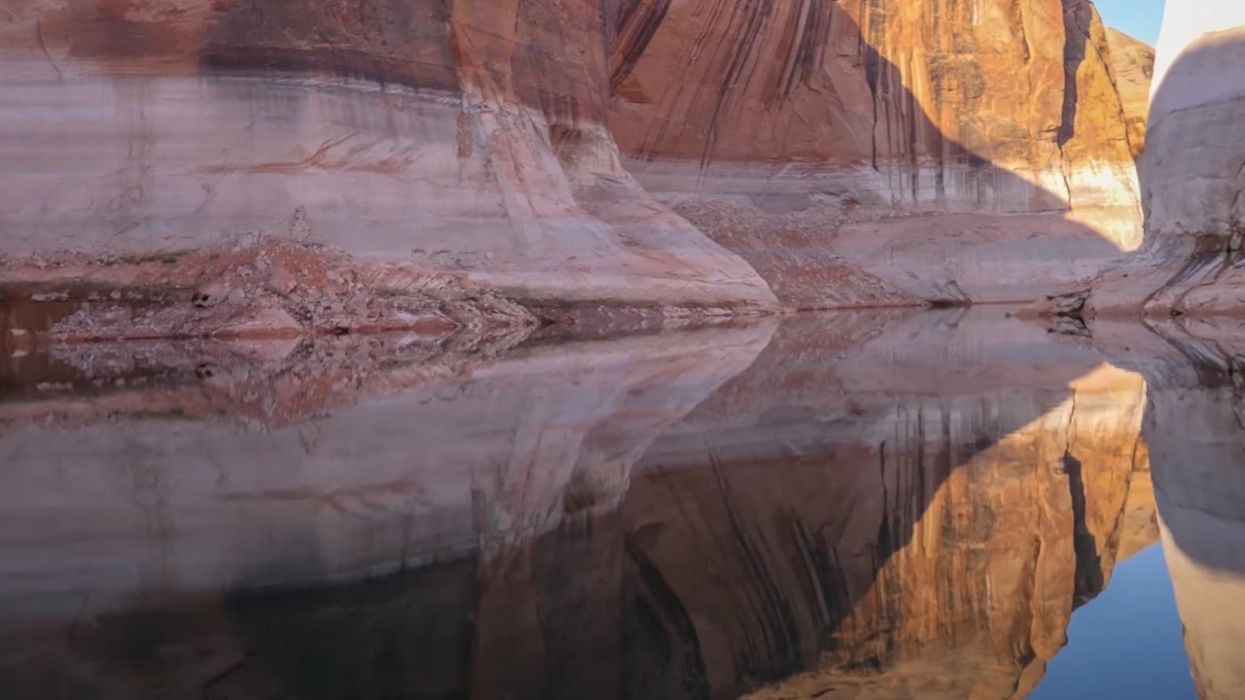Environmental Groups, Bipartisan EPA Leaders Hail Biden’s Climate Bill
Environmental groups are hailing the Inflation Reduction Act (IRA) as a desperately needed step to address catastrophic climate change. On Friday, three former Environmental Protection Agency administrators who served under Republican and Democratic presidents put out a joint statement in support of the bill.
The bill would cut greenhouse gas emissions 40 percent by 2030, according to environmental advocacy groups. That figure comes close to the Biden administration's goal of cutting greenhouse gases 50 percent by 2030.
The act would "be a huge step forward in the fight to preserve a livable planet and is one we need to take while we have the chance," according to the environmental law organization Earthjustice.
"We urge the Senate to move swiftly to pass the climate measures in the Inflation Reduction Act — and for the House to follow soon after — so we can keep building toward a more sustainable future," Kris Kuzdas of the Water for Arizona Coalition said in a press release on Wednesday.
The $739 billion legislation is the result of an unexpected agreement between Senate Majority Leader Chuck Schumer (D-NY) and Sen. Joe Manchin (D-WV). On Thursday, the last Democratic holdout, Sen. Kyrsten Sinema (D-AZ), said she would support the bill, allowing it to move forward with the votes of every Senate Democrat and no Senate Republicans.
The bill contains key climate provisions. These include multiple investments geared towards decarbonization. In the electric sector, the bill includes some $30 billion in the form of grants and loans for states and utilities to invest in renewables and clean energy.
The bill would also provide tax credits through 2033 for residential solar and geothermal heat pumps, solar investment, wind production, and offshore wind farms.
In transportation, the bill provides up to $4,000 in consumer tax credits for low- and middle-income individuals to purchase used electric vehicles and up to $7,500 for new electric vehicles.
The bill allocates $4.5 billion in rebates for home electrification for low- and middle-income households and allocates a further $4 billion for the Department of Housing and Urban Development for affordable housing.
Further provisions address cleaning up legacy pollution, some $30 billion in environmental and climate justice block grants to disadvantaged communities, a $27 billion Greenhouse Gas Reduction Fund, and resources for public lands and waters.
This winter, the Intergovernmental Panel on Climate Change (IPCC) issued its most dire warning to the planet:
To avoid mounting loss of life, biodiversity and infrastructure, ambitious, accelerated action is required to adapt to climate change, at the same time as making rapid, deep cuts in greenhouse gas emissions. So far, progress on adaptation is uneven and there are increasing gaps between action taken and what is needed to deal with the increasing risks.
This summer may be the hottest in United States history, according to one metric. The Southwest is struggling with the worst "megadrought" in 1,200 years. Texas is on track for the hottest summer it has ever recorded, threatening to break the 2011 record with more than 90 days above 100 degrees. Last week, dozens of people in St. Louis and Eastern Kentucky were killed as the region saw not one but two 1-in-1,000-year floods.
Arizona is already experiencing dramatically higher temperatures and more humidity. Phoenix was ranked by one study as the second fastest-warming city in the U.S. By 2050, the likelihood of severe summer droughts is expected to triple, and electricity bills will likely increase significantly as residents struggle to stay cool.
Some environmental groups say the Inflation Reduction Act doesn't go far enough to fight the devastating effects of climate change, citing the bill's provisions for new oil and gas leases.
"The deal is indeed a compromise," Earthjustice says in its press release, "that includes objectionable handouts to the fossil fuel industry."
However, on balance, the group says that the bill "would lower barriers to solar access, create good paying jobs, invest in underserved and overburdened communities, and put the country closer to achieving our climate targets."
Sandy Bahr, director of the Grand Canyon chapter of the Sierra Club, said the bill is flawed but still necessary.
"We need the tools in this bill to better ensure resiliency in frontline communities, to help clean up our air, and to provide jobs with these clean energy investments," Bahr told the American Independent Foundation. "This is not a perfect bill. There are some significant negative aspects including the harmful oil and gas leasing provisions. On balance, we think it is important that the good in this bill move forward."
The bill, while appearing to have total support from the Senate Democrats, still faces hurdles in the budget reconciliation process — a strategy for avoiding the filibuster. Senate Minority Whip John Thune (R-SD) said Republicans planned to vote on amendments that would make the bill less appealing to Democrats.
"This bill shouldn't pass and become law," Sen. John Barrasso (R-WY) said. "It's going to cause a lot of pain for the American people."
More than 1,000 amendments were filed the last time the Senate passed legislation like this through reconciliation, according to Sen. Roy Blunt (R-MO).
Schumer has said that the Senate will likely start voting on the bill on Saturday, with a House vote expected next week.
Reprinted with permission from American Independent.



